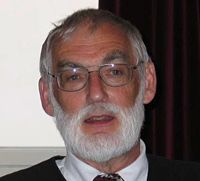Dennis Meadows
From Santa Fe Institute Events Wiki

Dennis Meadows is a systems analyst and environmental educator. Since joining the faculty of MIT in 1970, he has served as a tenured professor in business, engineering, and the social sciences at three American universities. His ten books have been translated into more than 30 languages. His 1972 book with Donella Meadows for the Club of Rome was awarded the German Peace Prize and selected to be among the ten most important environmental texts of the 20th century. Another of his books was selected as the most important book on the future published in the German language in 2006.
Currently he is President of the Laboratory for Interactive Learning. In that role he designs sophisticated management-training simulations. They are used in training programs around the world, for example, by the World Bank in Washington, the World Health Organization in Geneva, and an Italian federal Ministry.
He has served on the boards of companies in Europe and the United States. Professor Meadows has lived in six countries and lectured or consulted to corporate and government groups in over 40 nations. Among the many positions he has held are: Fulbright Fellow in the Soviet Union, Director for the Division of Special Studies at the International Institute for Applied Systems Analysis in Austria, and Director of the Institute for Policy and Social Science Research at the University of New Hampshire. He spends about one- third of each year living and working abroad.
He graduated from Carleton College with a BA in Chemistry and from MIT with a Ph.D. in Management, specializing in system dynamics, finance, and the management of research programs.
Professor Meadows has won many honors, prizes, and awards including the 1975 prize of the Association for Nature Protection in Bavaria, the 2005 prize for Environmental Communication of EURONATUR, a Presidential Medal of Honor from Hungary in 2006, and the Peace Clock Award of the German Committee for UNESCO in 2007. In 2009 he was chosen to receive the Japan Prize, that nation’s most prestigious award for contributions to science and global peace. He has received four honorary doctorates from American and European universities for his contributions to environmental education.
